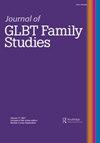谁投票给希拉里?性别认同、性别和家庭影响
IF 2
Q2 FAMILY STUDIES
引用次数: 25
摘要
性别身份可以影响政治态度和行动。在政治选举中,男同性恋者、女同性恋者和双性恋者(GLB)历来都支持民主党候选人。在最近的2016年总统选举中,这种模式持续存在,因为绝大多数glb在2016年选举中投票支持民主党总统候选人(希拉里·克林顿)。本研究试图通过Patrick Egan(2012)的政治独特性理论来解释为什么女同性恋和男同性恋压倒性地投票给候选人克林顿。通过使用2016年美国全国选举调查(N = 2691)的数据,本分析确定了性少数群体投票给民主党的倾向是否归因于三组变量:(a)选择,或者与GLB身份相关的特征也与政治自由主义有关;(b)嵌入性,或增加对LGB社区的参与导致更大的自由主义;(c) LGB身份的皈依或公开披露导致政治观点和行为发生重大变化的。考虑到对希拉里·克林顿(Hillary Clinton)的投票在女同性恋女性中最高,在异性恋男性中最低,对性别异性恋的交叉关注也得到了特别关注。本文章由计算机程序翻译,如有差异,请以英文原文为准。
Who Voted for Hillary Clinton? Sexual Identities, Gender, and Family Influences
ABSTRACT Sexual identities can influence political attitudes and actions. During political elections, gay men, lesbians, and bisexual individuals (GLB) have historically aligned with Democratic candidates. In the recent presidential election of 2016, this pattern persisted, as the vast majority of GLBs voted with the Democratic candidate for president in the 2016 elections (Hillary Clinton). This study tries to explain why lesbians and gay men overwhelmingly voted for candidate Clinton through Patrick Egan's (2012) theory of political distinctiveness. In using data the American National Election Survey of 2016 (N = 2,691), this analysis determines if the tendency of sexual minorities to vote Democratic was due to three sets of variables: (a) selection, or the characteristics associated with GLB identities are also associated with political liberalism; (b) embeddedness, or increased involvement in the LGB community leads to greater liberalism; and (c) conversion, or public disclosures of LGB identities causes major changes in political outlooks and actions. Special attention is also give to the intersectional concerns of gendered heterosexism, given that voting for Hillary Clinton was the highest among lesbian women and lowest among heterosexual men.
求助全文
通过发布文献求助,成功后即可免费获取论文全文。
去求助
来源期刊

JOURNAL OF GLBT FAMILY STUDIES
FAMILY STUDIES-
CiteScore
3.90
自引率
0.00%
发文量
0
期刊介绍:
The Journal of GLBT Family Studies is a much-needed resource on the working dynamics of the diverse family structures found in every corner of the world. This groundbreaking new journal addresses the vital issues facing gay, lesbian, bisexual, and transgender individuals and their families. Edited by Dr. Jerry J. Bigner, who has provided expert witness testimony in legal cases and in the litigation involving same-sex marriages in Canada, the journal features interdisciplinary studies and scholarly essays on topics related to GLBT family life and functioning as well as relationships with other families.
 求助内容:
求助内容: 应助结果提醒方式:
应助结果提醒方式:


